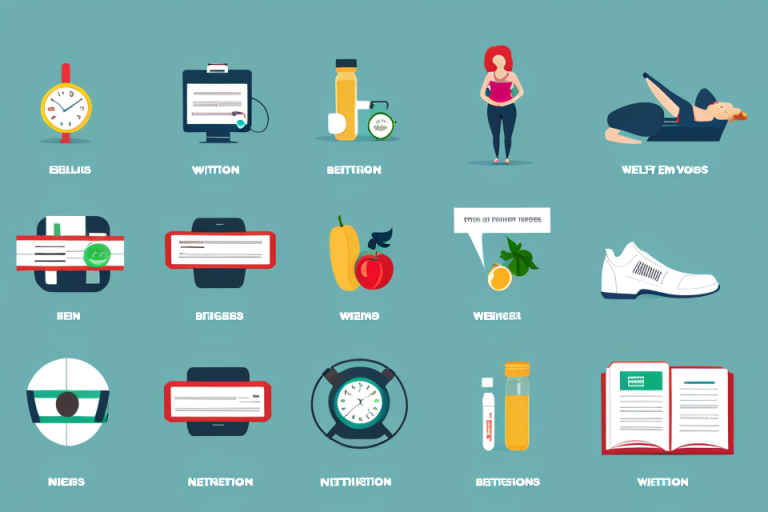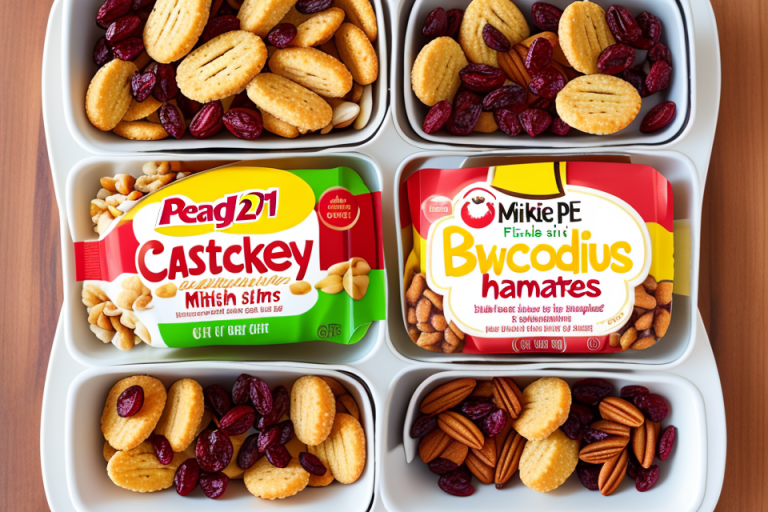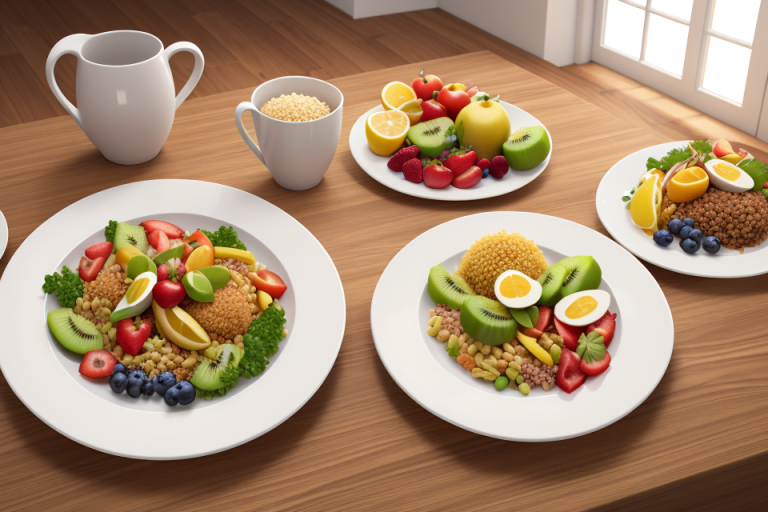What Meal Can I Eat Everyday That Is Healthy?
Are you on the quest for a daily feast that not only tantalizes your taste buds but also nourishes your body with wholesome goodness? Look no further, for I present to you the epitome of health and delight—a meal that will leave you craving for more, day after day! Picture this: a vibrant kaleidoscope of colors adorning your plate, a symphony of flavors dancing on your tongue, and a burst of energy fueling your every move. This extraordinary culinary masterpiece embraces all the essential nutrients, championing your well-being effortlessly. From succulent grilled chicken brimming with protein, to a medley of crisp, garden-fresh vegetables teasing your palate—this everyday healthy meal doesn’t just satisfy your hunger; it ensures you savor a symphony of wellness with every single bite.
Understanding the Importance of Daily Healthy Eating Habits
Eating healthily every day plays a crucial role in maintaining good health and preventing diseases. It’s not just about losing weight or fitting into skinny jeans; it’s about nourishing our bodies with essential vitamins, minerals, proteins, carbohydrates, fats, fiber, and water that are required for optimal functioning.
Adopting a daily healthy eating routine can help reduce the risk of chronic illnesses such as heart disease, diabetes, obesity, hypertension, and certain types of cancer. Moreover, it improves mental clarity, boosts energy levels, enhances mood, and increases longevity.
However, there are several misconceptions surrounding healthy eating habits that need to be addressed. For instance, some people believe that skipping meals is an effective way to lose weight when, in fact, it leads to overeating later on and may cause nutrient deficiencies. Others think that all calories are created equal, which is incorrect because different foods have varying effects on blood sugar levels, satiety, and metabolism.
In conclusion, understanding the importance of daily healthy eating habits and dispelling myths around them is vital for leading a healthier lifestyle.
Essential Components of a Balanced and Nutritious Meal
Building a Foundation with Whole Grains and Fiber
Whole grains play an essential role in building a balanced and nutritious meal. They provide important nutrients that promote healthy digestion and support weight management. Incorporating whole grains into your diet can help you maintain good health and prevent chronic diseases such as heart disease, type 2 diabetes, and certain types of cancer.
Examples of whole grain options include brown rice, quinoa, oats, barley, and whole wheat bread. These foods are rich in fiber, which helps regulate bowel movements and keeps you feeling full for longer periods. Additionally, whole grains contain vitamins, minerals, antioxidants, and phytochemicals that have numerous health benefits.
To incorporate more whole grains into your daily meals, consider replacing refined grains like white rice, pasta, and bread with their whole grain counterparts. You can also add cooked or instant oats to smoothies, yogurt, or overnight oats for added texture and flavor. Another option is to try out different whole grain flours when baking cookies, muffins, or other treats.
In summary, including whole grains in your daily meals is crucial for promoting overall health and well-being. By making small changes to your diet, you can improve your nutrition and reap the many benefits of whole grains.
Fueling Your Body with Lean Protein Sources
Proteins are essential macronutrients that play a crucial role in maintaining overall health. They help build and repair tissues, support immune function, promote muscle growth and development, and aid in various metabolic processes. Including lean proteins in daily meals is vital for fueling the body effectively.
Lean protein sources include fish, poultry, eggs, legumes, nuts, seeds, low-fat dairy products, and soy products such as tofu. These foods provide all essential amino acids required by the human body and have minimal amounts of saturated fats.
Here are some tips for incorporating lean protein into your diet:
- Plan ahead – Make a list of lean protein options available at home or nearby stores before grocery shopping. This will make it easier to prepare balanced meals throughout the week.
- Get creative – Experiment with different cooking methods like grilling, roasting, baking, or stir-frying to add variety to your dishes without adding extra calories from fat.
- Mix and match – Combine different types of lean protein sources in one meal to increase nutritional value and satisfaction. For example, have grilled chicken breast with quinoa and steamed broccoli.
- Use substitutions – Replace high-fat animal protein with plant-based alternatives when possible. For instance, use lentils instead of ground beef in spaghetti sauce or black bean burgers instead of beef patties.
- Keep portions in check – Aim for portion sizes that fit your individual needs and avoid overeating. Consult a registered dietitian if you need personalized guidance on appropriate serving sizes.
Nourishing Your Body with Colorful Fruits and Vegetables
Colorful fruits and vegetables play an important role in providing essential vitamins and minerals that our bodies need to function properly. Consuming a variety of these foods can help ensure that you are getting all the nutrients your body needs.
Here are some tips for incorporating more fruits and vegetables into your daily meals:
- Start your day off right by having a fruit or vegetable smoothie for breakfast. This is a great way to get a serving of produce first thing in the morning.
- Add veggies to your omelets or scrambled eggs. Spinach, tomatoes, peppers, and mushrooms are all delicious options.
- Snack on baby carrots, cherry tomatoes, or sliced bell peppers instead of chips or cookies.
- Make salads the star of your meal. Load up on colorful lettuces like romaine, arugula, and spinach, then add a variety of veggies like cucumbers, radishes, and red cabbage.
- Experiment with different ways to cook vegetables. Roasting, grilling, and sauteeing can bring out their natural flavors and make them even tastier.
By incorporating more fruits and vegetables into your diet, you can nourish your body and promote overall health and wellness.
Healthy Fats for Optimal Health
Healthy fats play an essential role in maintaining optimal health. They are crucial for brain function, hormone production, cell membrane stability, and absorption of fat-soluble vitamins. Including healthy fats in your daily diet can help reduce inflammation, improve heart health, and promote weight loss.
There are several types of healthy fats that you should include in your meals every day. These include:
-
Omega-3 fatty acids – found in fatty fish such as salmon, mackerel, and sardines, omega-3s have anti-inflammatory properties and support brain health.
-
Avocado – this fruit is rich in monounsaturated fats that can lower bad cholesterol levels and reduce the risk of heart disease.
-
Nuts – including nuts like almonds, walnuts, and cashews in your diet can provide you with healthy unsaturated fats and other nutrients such as fiber, protein, and vitamin E.
-
Olive oil – extra virgin olive oil contains antioxidants and healthy monounsaturated fats that can benefit heart health when used in place of saturated or trans fats.
-
Fatty fish – fish such as wild salmon, mackerel, and herring are excellent sources of omega-3 fatty acids that support brain function and cardiovascular health.
Incorporating these foods into your daily meals can help ensure that you get enough healthy fats in your diet to maintain optimal health.
Meal Ideas for Everyday Healthy Eating
Breakfast Options for a Nutritious Start
Breakfast is considered as one of the most important meals of the day because it sets the tone for our energy levels, mood, and overall productivity throughout the rest of the day. Here are some nutritious and balanced breakfast options that can help you start your day off on the right foot:
-
Overnight oats with berries and nuts – This simple yet delicious breakfast option packs in plenty of fiber, protein, and healthy fats from the combination of rolled oats, Greek yogurt or almond milk, fresh berries, and chopped nuts like walnuts or almonds. You can also add a scoop of plant-based protein powder if desired.
-
Avocado toast with egg – Another great option is avocado toast with an egg cooked however you prefer (scrambled, poached, or fried). The creamy texture of the avocado pairs perfectly with the runny yolk of the egg, providing a satisfying and filling breakfast.
-
Green smoothie bowl – Blend together spinach, kale, banana, almond milk, and a handful of granola or chia seeds into a thick and creamy smoothie bowl. Top it off with sliced fruit, coconut flakes, or a drizzle of honey for added sweetness.
-
Veggie omelette – For those who love their eggs but want more veggies in their diet, try making a vegetable omelette filled with bell peppers, onions, mushrooms, tomatoes, and spinach. Add a sprinkle of cheese or crumbled bacon for extra flavor.
-
Yogurt parfait – Layer plain Greek yogurt with your favorite fresh fruit, granola, and a drizzle of honey for a quick and easy breakfast that’s both nutritious and delicious.
Satisfying and Nutrient-Dense Lunch Ideas
Packable lunch ideas can be both satisfying and nutritious when they are balanced in terms of macronutrients. Here are some healthy lunch options that will keep you energized throughout the day:
-
Grilled chicken salad with mixed greens, cherry tomatoes, cucumber, avocado, and quinoa. This salad is packed with protein from the grilled chicken, fiber from the vegetables, and healthy fats from the avocado. It’s also easy to prepare ahead of time and take with you on-the-go.
-
Vegetarian stir-fry with brown rice noodles, broccoli, bell peppers, carrots, zucchini, and tofu. This dish is loaded with vitamins, minerals, and antioxidants from the colorful veggies. The combination of protein from the tofu and whole grain carbs from the brown rice noodles makes it a well-rounded meal.
-
Turkey and hummus wrap with baby spinach, roasted red pepper, and sliced almonds. This wrap provides a good balance of lean protein from the turkey, healthy fats from the hummus, and fiber from the leafy greens. The addition of nuts adds a crunchy texture and extra nutrients like omega-3 fatty acids.
These satisfying and nutrient-dense lunch ideas can help you maintain a healthy diet while keeping your energy levels up throughout the day.
Wholesome Dinner Recipes for Well-Rounded Meals
Dinner time is an opportunity to provide our bodies with essential nutrients that support overall wellness. Here are some wholesome dinner recipe ideas that incorporate a variety of food groups to create balanced and delicious meals suitable for different dietary preferences:
1. Grilled Salmon with Quinoa and Steamed Vegetables
– This dish provides protein from salmon, fiber from quinoa, and vitamins from vegetables like broccoli or carrots. It’s also easy to customize based on personal tastes and dietary needs.
2. Lentil Soup with Brown Rice and Roasted Brussels Sprouts
– Lentils are packed with plant-based protein and fiber while brown rice provides complex carbohydrates. The roasted brussels sprouts add a touch of crunch and flavor.
3. Stir Fry with Tofu, Bell Peppers, and Onions over Cauliflower Rice
– This dish offers a mix of protein from tofu, vitamins A and C from bell peppers, and fiber from cauliflower rice. You can also adjust the spices to suit your taste buds.
4. Baked Chicken Thighs with Roasted Carrots and Potatoes
– Chicken thighs provide lean protein, while roasted carrots and potatoes offer sweetness and starch. This dish is simple yet satisfying.
Incorporating these wholesome dinner recipes into your daily routine can help you maintain good health and prevent chronic diseases. Remember to drink plenty of water throughout the day and engage in regular physical activity for optimal wellbeing.
Healthy Snacks to Fuel Your Day
Snacking can be a great way to fuel your body throughout the day while also providing essential nutrients that support overall health. Here are some tips on how to choose healthy snacks that will help you stay energized and nourished without derailing your diet goals.
Balancing Macronutrients in Your Snack Choices
Macronutrients such as carbohydrates, proteins, and fats play an important role in keeping our bodies functioning properly. When choosing snacks, it’s important to balance these macronutrients to ensure you’re getting all the energy and nutrients you need.
-
Carbohydrates provide quick energy and should make up around 40-60% of your daily calorie intake. Look for whole grain options like whole wheat crackers or brown rice cakes.
-
Protein is essential for building muscle tissue and repairing cells. Incorporate protein into your snacks by eating Greek yogurt with berries or having a hard boiled egg.
-
Fats are crucial for hormone production and brain function. Opt for healthy fat sources like avocado slices or almond butter on apple slices.
Homemade Snack Ideas
Making your own snacks allows you to control what goes into them and avoid added sugars and preservatives found in many store-bought options. Try making some of these homemade snacks:
-
Hummus and veggies – Mix together hummus with raw vegetables like bell peppers, carrots, and cherry tomatoes for a satisfying and nutritious snack.
-
Trail mix – Combine nuts, seeds, dried fruit, and dark chocolate pieces for a delicious and filling snack that provides a good balance of macronutrients.
-
Overnight oats – Make a batch of overnight oats using rolled oats, milk, yogurt, and your favorite fruits and nuts. This makes for an easy grab-and-go breakfast option.
Convenient Store-Bought Options
Sometimes it’s nice to have a convenient snack option available when you need it most. Here are some store-bought snacks that can fit into a healthy diet:
-
Greek yogurt cups – Look for low-fat or fat-free varieties packed with fresh fruit or honey for a sweet treat.
-
Roasted chickpeas – These crunchy snacks provide protein and fiber while also being lower in calories than traditional potato chips.
-
Protein bars – Choose bars made from whole food ingredients such as nuts, seeds, and real fruit instead of those loaded with added sugars.
Tips for Maintaining a Healthy Eating Routine
Meal Planning and Preparation for Success
Meal planning and preparation are essential components of maintaining a healthy eating routine. By taking the time to plan out your meals in advance, you can ensure that you’re consuming nutritious foods that support your overall health and wellbeing. Here are some tips for effective meal prepping and organizing your meals:
- Benefits of meal planning:
- Increased adherence to healthy dietary guidelines
- Improved weight management
- Reduced stress around mealtime decisions
-
Better budgeting for groceries
-
Tips for effective meal prepping:
- Start by assessing your weekly schedule and identify days when you have more or less free time to prepare meals.
- Plan ahead for busy weeks or events (e.g., travel) that may disrupt your normal routine.
- Choose recipes that are easy to make and store, such as salads, soups, or overnight oats.
- Consider incorporating leftovers into your meal prep strategy to reduce waste and save time.
-
Strategies to stay on track with your healthy eating goals:
- Set realistic expectations for yourself and avoid falling into all-or-nothing thinking.
- Be flexible and adaptable in your approach to meal planning, allowing room for occasional indulgences or changes in your routine.
- Stay connected to why healthy eating is important to you, whether it’s for physical or emotional reasons.
- Seek support from friends, family, or online communities who share similar values and goals.
Mindful Eating Practices for Optimal Health
Mindful eating practices are essential for optimal health as they help individuals become more aware of their food choices and consumption patterns. By incorporating these practices into daily routines, people can improve their overall wellbeing by making informed decisions about what they eat. Here are some tips for implementing mindful eating habits:
-
Slow Down – Take time to enjoy each meal by chewing slowly and thoroughly. This helps with digestion and allows the brain to register feelings of satiety before overeating.
-
Pay Attention – Be present while eating and focus on the taste, texture, and smell of the food. This heightened awareness will help you appreciate the flavors and avoid distractions that may lead to overeating.
-
Listen To Your Body – Learn how to recognize physical cues such as hunger and fullness. Pay attention to when you feel hungry and stop eating when you’re no longer hungry but satisfied.
By practicing mindful eating habits, individuals can develop a healthier relationship with food and make better choices that support overall health and wellbeing.
Staying Hydrated and Limiting Sugary Beverages
Water is essential for maintaining good health as it helps in digestion, regulating body temperature, and transporting nutrients through our bloodstream. It’s crucial that we stay properly hydrated by drinking enough water every day. However, consuming too many sugary beverages can lead to weight gain, type 2 diabetes, and other chronic diseases. Therefore, it’s important to limit our consumption of these unhealthy options. Here are some tips on how you can achieve this:
-
Increase Your Water Intake: Drinking plenty of water throughout the day can help keep you feeling fuller for longer periods, reducing your cravings for unhealthy snacks. Try carrying a reusable water bottle with you wherever you go and set reminders to drink water at regular intervals.
-
Choose Healthier Alternatives: Instead of reaching for soda or juice, opt for zero-calorie drinks like sparkling water, herbal tea, or black coffee. You could also try infusing water with fruits and vegetables for added flavor without any additional sugar.
-
Limit Consumption of Sugary Beverages: If you do choose to have something sweet, stick to small portions and avoid frequent indulgence. Consider having one occasional treat instead of multiple smaller ones throughout the week.
By following these simple steps, you can improve your overall health while still enjoying the occasional sweet treats in moderation. Remember to always consult with a medical professional before making significant changes to your diet if you have any preexisting conditions.
FAQs for the topic: What meal can I eat every day that is healthy?
What is the importance of having a healthy meal every day?
Eating a healthy meal every day is crucial for maintaining overall well-being. A balanced diet provides essential nutrients, vitamins, and minerals that support bodily functions, boost energy levels, aid in digestion, and promote a strong immune system. Regularly consuming healthy meals can help prevent chronic diseases like diabetes, heart disease, and obesity, and also contribute to better mental health.
What factors should I consider when choosing a healthy meal to eat every day?
When selecting a meal to eat daily, it is essential to consider a few factors. Firstly, ensure that the meal is nutritionally balanced, including a good combination of protein, carbohydrates, healthy fats, fiber, and plenty of fruits and vegetables. Additionally, take into account calorie intake, as consuming excessive calories can lead to weight gain. Consider portion sizes and opt for whole, unprocessed foods rather than processed alternatives. Lastly, personal preferences, dietary restrictions, and individual health goals should also be considered.
Is there a specific meal that is considered healthy to eat every day?
There is no specific meal that works universally for everyone. However, several options can make for a healthy meal choice when consumed regularly. For example, a plate consisting of grilled chicken or fish, steamed vegetables, and a serving of brown rice or quinoa can be a great option. Another possibility is a colorful salad with a variety of fresh vegetables, lean proteins like grilled tofu or chickpeas, and a light vinaigrette dressing. Ultimately, the key is to incorporate a diverse range of nutrient-dense ingredients into your meals each day.
Can I have the same meal every day without it becoming monotonous?
While it is possible to have the same meal every day, it may become monotonous over time. To avoid this, try incorporating slight variations into the meal while retaining its nutritional value. Experiment with different herbs, spices, and seasonings to add flavor. You can also switch up cooking methods or try alternative ingredients to keep it interesting. Additionally, creating meal plans with a rotating menu of healthy options for each day can help prevent boredom and ensure a varied and nutritious diet.
Are there any specific dietary restrictions or considerations to keep in mind when choosing a daily healthy meal?
Yes, depending on personal dietary restrictions or health conditions, certain considerations need to be kept in mind when choosing a daily healthy meal. For instance, individuals with gluten intolerance or celiac disease should avoid gluten-containing ingredients. Those with lactose intolerance should opt for dairy alternatives or lactose-free options. Additionally, people with diabetes should be mindful of their carbohydrate intake, while individuals with allergies need to avoid any allergens they may have. Consulting with a healthcare professional or registered dietitian is recommended for personalized dietary advice based on individual needs and restrictions.







